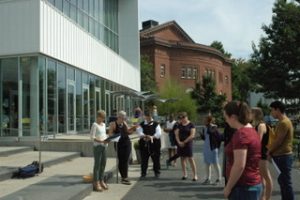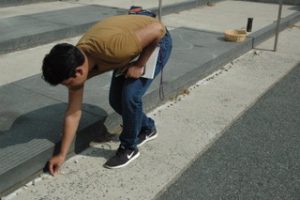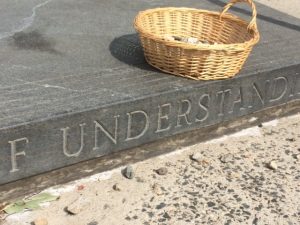 On Tuesday, September 26, students, faculty, staff, and community members gathered on Chapin Lawn to stand in solidarity with those affected by recent natural disasters in Mexico, Puerto Rico, the Dominica, Texas, Florida, and many other places. We also wanted to acknowledge the unprecedented scale and scope of these disasters and the continuing impacts of climate change.
On Tuesday, September 26, students, faculty, staff, and community members gathered on Chapin Lawn to stand in solidarity with those affected by recent natural disasters in Mexico, Puerto Rico, the Dominica, Texas, Florida, and many other places. We also wanted to acknowledge the unprecedented scale and scope of these disasters and the continuing impacts of climate change.
Below are Reverend Matilda Cantwell’s remarks from the vigil.
Friends, we are gathered here in a vigil of acknowledgement of the natural disasters that have ravaged whole communities this fall. Beginning in late August, hurricane Harvey caused catastrophic flooding in East Texas, the Caribbean, Guyana, Barbados, and Colombia, among other places. Hurricane Irma followed, causing devastation in the Caribbean islands and the Florida Keys. These were followed by hurricane Maria, which has caused unprecedented damage to the islands of Puerto Rico and Dominica.
On September 19th, a series of earthquakes hit Mexico near Mexico City and the cities of Puebla and Morelos, just following the anniversary of the historic earthquake of 1985.
We have named just a few of the places, and spoken to none of the details of the disasters which have ravaged places in our globe with already compromised infrastructures, which as we well know are the ones upon whom the toll of climate change is being taken.
Hear these words by Somali-born poet Warsan Shire, first in Spanish and then in English:
he estado orando,
y asi es como se ven las oraciones:
querido dios
vengo de dos países
uno tiene sed
el otro esta en llamas
ambos necesitan agua.mas tarde esa noche
tenía un atlas en mi regazo
corrí mis dedos por todo el mundo
y susurró
¿donde duele?contestó
en todos lados
en todos lados
en todos lados.
(Spanish translation by Mariana Estrella Rivera, Area Coordinator)
i’ve been praying,
and these are what my prayers look like;
dear god
i come from two countries
one is thirsty
the other is on fire
both need water.later that night
i held an atlas in my lap
ran my fingers across the whole world
and whispered
where does it hurt?it answered
everywhere
everywhere
everywhere.
“Everywhere” is in Puerto Rico, it is in Mexico, it is in Dominica, and so many other places we haven’t named. “Everywhere” is also right here, right around us.
So we ask you to take a moment to look around at one another, or if you are more comfortable, at the trees and ground and sky that is our precious inheritance. Looking at each other, know that the reverberations of the suffering in these places are right here, right now. People among us have family and friends and homes in these places. As you look around, you might catch the eye of a fellow student, or staff or faculty, and we invite ourselves to show one another that we care.
No response can be adequate. No words can begin to express what is being faced around the world, especially in the small harbors, verdant fields, and tiny towns swelling already with work and tears, tucked away from the front pages, the Facebooks feeds, minds and algorithms of those who decide what is most newsworthy.
Some philosophers have said that a community is that which has a single living center, a purpose to which all its members relate in some way. At Smith our center is filled with identities, perspectives, and life experiences as diverse as the globe, yet we are all here for the purpose of education, and what is truly learning, if it is not an opening of the heart? We invite you to be a community today of open hearts.
I invite you to take a stone to place here in a line, saying to yourself or out loud the name of a person or place you wish to bring to mind and heart today. We name so that we can pay attention, so that we can be in solidarity. We will do this spontaneously but slowly, so that each person who wishes to come forward and place a rock in the line can have our attention. After I close the vigil, you are still welcome to place stones in the line and we warmly invite you to do so.
Benediction: Go with open hearts, which is the beginning of care for our broken but beautiful world. Go in the peace which is, in the words of the Reverend Dr. Martin Luther King, Jr. “not the absence of tension, but the presence of justice.”
During and after Matilda’s remarks, small rocks were placed in front of the Campus Center steps to symbolize the support for and acknowledgment of all the pain that so many are experiencing in the Smith community and all over the world. Brave individuals stepped forward to state out loud who and what their rock was for. Some rocks were placed in silence. The space became more and more open, real, and somber as the reality of this disasters sunk in. In an intentional moment of silence concluding the vigil, attendees prayed and reflected on the tragedy, bringing the community together.


